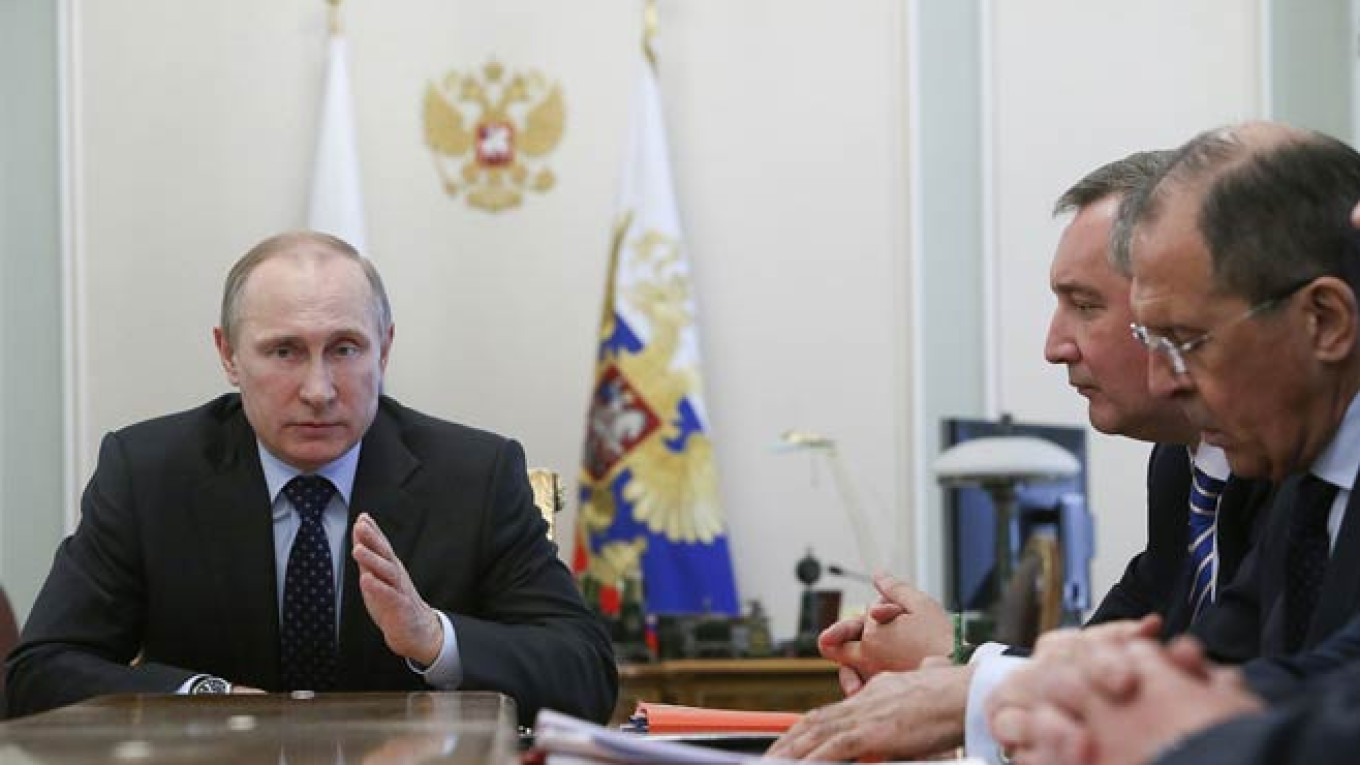Russia's state-owned exporter Gazprom may start to demand up-front payments before supplying gas to Ukraine, as discussed at a government meeting chaired by President Vladimir Putin in Novo-Ogaryovo on Wednesday.
In the current situation, "Gazprom will supply gas in the volumes prepayed by Ukraine a month in advance," Putin said, Interfax reported.
But he then asked the government and Gazprom executives to put off the measure for now in order to seek more consultations with Ukraine. That is, "if our partners want them," Putin said, Interfax reported.
Since the beginning of April, the gas price for Ukraine has increased by 80 percent — to $485 per 1,000 cubic meters, which is $115 higher than European countries pay on average.
Besides the gas price hike, which authorities said was linked with Ukraine's $2.2 billion debt for previous supplies, Ukraine was deprived of the $100 per 1,000 cubic meters discount it had in exchange for allowing the Russian Black Sea Fleet to stay at a Crimean naval base. After Russia took over Crimea, it cancelled the deal saying the base was now on its territory.
Ukrainian authorities have already refused to pay the new price, saying it was politically motivated, and warned of possible comeback of the 2009 crisis when gas supplies to Europe were temporarily disrupted.
"The price [of almost] $500 for a thousand cubic meters cannot be accepted, at least on the basis of the fact that we do not agree that the Russian Black Sea Fleet is no longer on Ukraine's territory," the country's Energy Minister Yury Prodan said, Itar Tass reported Wednesday.
Concerns that Russia may cut off Ukraine's gas supplies, which would have possible negative consequences for Europe, have caused European Union officials, industry representatives and the Ukrainian energy minister to hold urgent talks in Brussels on Tuesday over alternative sources and routes.
As a result, the European Commission has decided to draw up a detailed plan on energy security by June, Itar Tass reported.
As for Ukraine, participants of the meeting discussed the possibility that part of its gas could come as reverse flows from Slovakia, Hungary and Poland.
Earlier last week Ukrainian Prime Minister Arseny Yatsenyuk said Ukraine could get up to 20 billion cubic meters of gas per year from reverse flows, almost meeting its overall demand. The reverse gas would be from $100 to $150 cheaper than gas coming directly from Russia.
But Gazprom CEO Alexei Miller in an interview with Russian state television channel on Saturday said that reverse gas flows are illegal without the company's authorization.
Some European pipeline operators have already said they would not challenge Gazprom's decision? against reverse flows.
"Gazprom does not agree with this [reverse flows], and thus it is not an option," a spokesman for Slovak pipeline operator Eustream told Reuters.
If there are any disruptions of gas supplies, they will only affect Ukraine, not the EU, said Lilit Gevorgyan, a senior economist at IHS Global Insight, a U.S.-based international consultancy.
"Under the 2009 contract Ukraine has an obligation to ensure safe flow of EU-bound Russian natural gas. Russia has been prompt with its payments of transit fees to Ukraine, hence the burden will be on Kiev to ensure that the European consumers do not suffer from a potential energy fallout between Russia and Ukraine," Gevorgyan said.
Dmitry Baranov, a leading expert at Finam Management consulting company, said that if Ukraine disrupted Russia's gas supplies to Europe it would mean a stab in the back to the EU, as it has been supportive of Ukraine throughout the recent political tensions with Europe.
The EU has alternative supply routes and Russia is dependent on transit through Ukraine for only half of its gas, compared to 85 percent in 2000 and 95 percent in the mid-1990s, Gevorgyan said.
The EU also has less to worry in the short run due to a mild winter that allowed it to store enough gas to weather any disruption, the analyst said, adding that the peak demand season has now passed, helping to calm the nerves of EU importers.
In any case, possible disruption of gas supplies is a negative scenario for all sides of the conflict, Baranov said.
"Suspending supplies [to Ukraine] will not help Russia retrieve the gas debt and it will add to the flow of negative evaluation of its action that have already mounted due to the latest events," he said.
The situation could be resolved to mutual benefit if the gas experts met to discuss issues in terms of economics and put aside political matters, Baranov added.
Contact the author at [email protected]
A Message from The Moscow Times:
Dear readers,
We are facing unprecedented challenges. Russia's Prosecutor General's Office has designated The Moscow Times as an "undesirable" organization, criminalizing our work and putting our staff at risk of prosecution. This follows our earlier unjust labeling as a "foreign agent."
These actions are direct attempts to silence independent journalism in Russia. The authorities claim our work "discredits the decisions of the Russian leadership." We see things differently: we strive to provide accurate, unbiased reporting on Russia.
We, the journalists of The Moscow Times, refuse to be silenced. But to continue our work, we need your help.
Your support, no matter how small, makes a world of difference. If you can, please support us monthly starting from just $2. It's quick to set up, and every contribution makes a significant impact.
By supporting The Moscow Times, you're defending open, independent journalism in the face of repression. Thank you for standing with us.
Remind me later.


